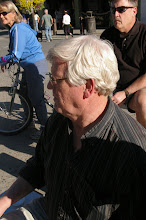Today, there seems to be considerable concern for safety. Much more so than in the fifties. I remember a Ford ad on TV. The ad started with a Ford automobile in the picture. Then a wrecking ball hit the side of the car and demonstrated the safety of side impact on the car with a heavy and stout frame. Nobody cared. Ford considered the ad to be a flop, and took it off the air. This week I went to look at new cars, when we considered the Ford Escape hybrid, it seemed that all the sales guy wanted to talk about was the safety of the automobile.!!.
So I wanted to share a little of what I have gleaned from my recent readings about the safety of H2 as a fuel. We have all seen pictures of the Hnderberg dirigible burning back in the thirties. I had, like most of us, assumed that since it was filled with hydrogen that we saw hydrogen burning. It is true that the fire started with hydrogen being ignited by a spark, but the thirty -six deaths did occur from fire!
"Despite the violent fire, most of the crew and passengers survived. Of the 36 passengers and 61 crew, 13 passengers and 22 crew died. Also killed was one member of the ground crew, Navy Linesman Allen Hagaman. Most deaths did not arise from the fire but were suffered by those who leapt from the burning ship. (The lighter-than-air fire burned overhead.) Those passengers who rode the ship on its descent to the ground survived. Some deaths of crew members occurred because they wanted to save more people on board the ship. In comparison, almost twice as many perished when the helium-filled USS Akron crashed. [12]"
Quoted from Wikpedia about the Hindeberg.
Today, the San Fransisco area is laboring under the results of a horrific fire that destroyed a critical piece of infrastructure. It was gasoline fueled. Hydrogen would not have caused this degree of destruction! Gasoline puddles and then burns from the surface for a long time. Hydrogen would burn to some extent, but most would quickly escape into the atmosphere and dissipate.
Hydrogen ignites at a higher concentration than does gasoline. The indicates that it takes four times higher concentration than does gasoline.
A problem does exist with hydrogen. It is odorless. If there were a leak it might go undetected. In a closed space this could have deleterious consequences. There is a simple solution for this problem. Just as with natural gas, add an oder agent. Make it smell!
Overall, I would have to conclude that hydrogen, H2, would increase the safety of our country compared to the ways we are currently using our energy sources.
Subscribe to:
Post Comments (Atom)

No comments:
Post a Comment